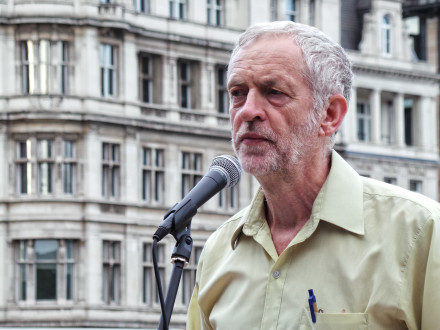
The Saudi crown prince’s recent visit to Britain highlighted the foreign policy differences between Theresa May’s Tories and Jeremy Corbyn’s Labour. For the Tories, Mohammed bin Salman’s visit was an opportunity to secure arms deals. For Labour, the visit was an opportunity to defend the people of Yemen and the region from belligerence and arbitrary intervention by the crown prince.
The sharpest expression came with the clash at Prime Minister’s Questions. Jeremy Corbyn called out the British government and military for directing the Saudi attacks, including upon children. May continued to defend British involvement and support for the war. This was despite the obvious strategic deadlock in the fighting; and despite that, according to the UN, 11 million Yemeni children are in acute need of aid as a result of the war.
The Tories have begun to fear international isolation after Brexit. This has pushed them ever closer to Donald Trump’s grisly embrace. Trump’s most significant policy shift in the Middle East has been to confront Iran, challenging the international agreement on Iran’s nuclear power programme. To confront Iran means to rely more heavily on the Saudi regime. Both Trump and May are following this course.
Instead of challenging the powerful popular militias, the Saudis are terrorising the civilian population with endless bombing and a cruel siege for a country that imports 90 per cent of its food staples. The country’s infrastructure is being destroyed from the air, by largely British-made planes piloted by Saudis who are trained by Britain. The only conclusion to draw is that the crown prince hopes the demoralisation of the people, under such suffering, will isolate the fighters and force surrender.
The crown prince is a destabilising factor in a region desperate for peace and diplomatic progress. In a short period, he has started the war on Yemen, creating, according to the UN, the worst humanitarian crisis in the world today.
He has imposed a blockade on Qatar, undermining the survival of the Gulf Co-operation Council, imposing hardship on Qatari residents and reducing the rights of Gulf citizens to travel and meet family members.
The Tories’ approach is based on the conventional hypocrisy of British foreign policy. It is premised on the suggestion that it is the responsibility of the British government to raise the “concerns” of the public – the lack of democracy, human rights, political liberties, etc – in Saudi Arabia, but in reality to prioritise promoting trade and commerce.
Jeremy Corbyn made it plain that the British government should not supply arms to Riyadh “while the devastating Saudi led bombing campaign of Yemen continues”. Addressing the Scottish Labour Party conference, he said: “what’s needed now is both a ceasefire and a concerted international effort to achieve a negotiated political settlement”. Many other Labour frontbenchers have reinforced this message and added to it.
Since the debacle of 1956, it has been evident that British foreign policy in the Middle East has been subordinate to the alliance with the US. Labour is breaking from that.
There are important implications arising from this difference. Under the Tory government since 2010, Britain has taken on new naval bases in the Gulf, in Bahrain and Oman. In 1971, Britain withdrew from “East of Suez”, in recognition that the balance of forces in the Gulf was no longer dependent upon Britain’s military power. So, what is the reason for the new bases?
Historically, the naval bases in Bahrain and Aden were essential to British policy in maintaining the passage to the British Empire in India. Once India obtained independence in 1947 the bases were redundant. Today, the first and essential purpose of the base in Bahrain is to assist the US in its “pivot” to confront China. Michael Fallon and Gavin Williamson have both made this fairly explicit.
But as a nation of 65 million in a world of over 7 billion, Britain’s role in the world must change. Pretensions of major influence, under the wing of the US, have drawn us into futile and devastating wars on Afghanistan, Iraq, Libya, Syria, Yemen and smaller operations elsewhere. These have been the greatest humanitarian catastrophes of the 21st century so far. There have been no real military or diplomatic victories. Instead we have created grinding conflicts impoverishing developing countries, with terrible destruction.
Labour must place conflict resolution at the heart of our foreign policy. The British electorate is ready for a change from endless wars. Jeremy Corbyn has secured a larger vote for Labour and a larger membership whilst promoting a supposedly unpopular campaign against these wars.
Equally, during the 2017 election it was clear that the British public is prepared to consider the significance of permanent war on our domestic reality and security. Despite reservations amongst some party members, Jeremy Corbyn’s speech after the Manchester terrorist attack was incredibly well received. Continuing to stand up to hysterical war-mongering and chauvinism wins over the electorate.
Stephen Bell is a Labour member and officer of Stop the War Coalition.
This piece was commissioned by guest editor Diane Abbott.




More from LabourList
‘Labour is being badly misled on housing’
Reeves bets on patience over populism
‘Energy efficiency changes must work for older private renters’